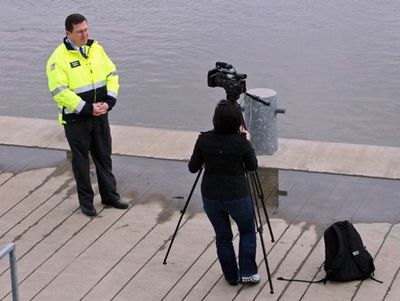What’s so bad about being smart, a river — or two — runs through us, remains of the winter day, how the world changed in a week, and Apple’s gay cure.
1) DISCUSSION: WHAT’S SO BAD ABOUT SMART?
Newsweek recentl asked 1,000 U.S. citizens to take America’s citizenship test. Twenty-nine percent couldn’t name the current vice president (Joe Biden). Seventy-three percent didn’t know why the U.S. fought the Cold War (stop the spread of Communism). Six percent couldn’t circle Independence Day on the calendar (July 4th).
What’s going on here? The magazine — in How Dumb Are We? — tried not to hurt our feelings by pointing out that the U.S. political system makes it hard for Americans to catch up, but let’s be honest with ourselves: These statistics show we’re often not a bright — or at least a well-informed — lot.
Is this why politicians who spare the details often are more popular than those who dive into the data?
The current conflict over government spending illustrates the new dangers of ignorance. Every economist knows how to deal with the debt: cost-saving reforms to big-ticket entitlement programs; cuts to our bloated defense budget; and (if growth remains slow) tax reforms designed to refill our depleted revenue coffers. But poll after poll shows that voters have no clue what the budget actually looks like. A 2010 World Public Opinion survey found that Americans want to tackle deficits by cutting foreign aid from what they believe is the current level (27 percent of the budget) to a more prudent 13 percent. The real number is under 1 percent. A Jan. 25 CNN poll, meanwhile, discovered that even though 71 percent of voters want smaller government, vast majorities oppose cuts to Medicare (81 percent), Social Security (78 percent), and Medicaid (70 percent). Instead, they prefer to slash waste–a category that, in their fantasy world, seems to include 50 percent of spending, according to a 2009 Gallup poll.
Last week, we were reading one of those anti-NPR blog posts which made a case for preventing any federally originated money from being used to buy NPR programming (or MPR programming for that matter) and in its litany of transgressions it said “NPR once aired a story defending elitism.”
NPR didn’t air such a “story,” it presented a segment on Talk of the Nation with Los Angeles Times critic Mark Swed, who had written a piece for his paper.
Just today, though, we find out that 1 in 4 kids in the Moorhead-Fargo area won’t meet national standards for graduating from high school. At a time when there’s criticism of teachers for not turning out kids that are as smart as we think they should be, why do we run away from our education and our fancy book learnin’? And why aren’t we more alarmed by our standing in the world when it comes to being informed?
Discuss.
2) A RIVER — OR TWO — RUNS THROUGH US
The clap of thunder you may have heard overnight, and the steady drumbeat of raindrops as you woke up, is the signal that the flood season picture has no changed dramatically. None of the official river projections to know have considered the substantial rainfall (snowfall up north).
In St. Paul, officials have told the people living in the Upper Landing development — that’s the one that caused everyone to wonder “why are they building housing there? — to be prepared to leave.
Down in New Ulm, the Cottonwood continues to rise. David Berg took this picture for me:
The Cottonwood will rise at least another five feet before cresting on Wednesday.
Meanwhile, on the Mississippi River, it’s hard to believe the levee in South St. Paul might be threatened, though officials say it’s a possibility. This is at 7.52 feet, 14 feet below what it will be by a week from today (it rose by a half-foot overnight).
Of course, nothing draws the cameras like high water. Teresa Boardman of St. Paul snapped this yesterday. Almost in the water, but not quite.
This year, I’ll be collecting screenshots of TV reporters standing in the water when reporting on the flood. Be on the lookout, please.
We heard from John Kurkosky of Annandale the other day, who let us know he’s written a song about the 2009 flooding of the Red River in Fargo-Moorhead. Hear it here. He says Fargo officials have asked for permission to use it as the soundtrack in a video. Expect it on YouTube soon.
3) REMAINS OF THE (WINTER) DAY
Today is the second day of spring, which serves as a reminder that we’re one day closer to next winter. That’s just the way the winter was this year. But reader Mike Finn took his motorcycle out for a ride yesterday and discovered there’s some might fine winter sculpture still being done by Minnehaha Creek.
4) HOW THE WORLD CHANGED IN A WEEK
Jon Stewart, who’s been off for a week, had a funny line last night, “When we left, the world’s biggest trouble spots were Wisconsin and the set of Two and a Half Men.” Then he asked a question that no reporter asked about the war in Libya: “Can we afford it?”
Meanwhile, there was a big media food fight last night when CNN’s correspondent in Libya called out FoxNews for reporting that journalists in Tripoli were used as human shields. Nic Robertson said the lone FoxNews employee never came out of his hotel to see what was going on.
5) APPLE’S GAY CURE
Gay? There’s an app for that. And that’s got a University of Minnesota professor upset. Pediatrics professor Gary Remafedi says the IPhone app “to help people leave homosexuality” misrepresents his research, the U of M Daily reports today. Remafedi studied the demographics of adolescent sexual orientation in Minnesota.
Apple gave the app its highest rating.
TODAY’S QUESTION
Former Gov. Tim Pawlenty announced Monday that he is forming an exploratory committee as a first step toward running for president. Would sort of a president would Tim Pawlenty be?
WHAT WE’RE DOING
Midmorning (9-11 a.m.) – First hour: America is a confident nation, and a nation of confident people. But sometimes that confidence means we overestimate our abilities. Midmorning looks at the roots of American immodesty.
Second hour: Guy Kawasaki is a man of the moment and a man of the future. He helped Apple achieve dominance, became a successful entrepreneur, and now is a Twitter sensation. His 10th book explains how to influence people while maintaining high ethical standards.
Midday (11 a.m. – 1 p.m.) – First hour: Dr. Jon Hallberg answers medical questions.
Second hour: Conductor Sarah Hicks.
Talk of the Nation (1-3 p.m.) – First hour: TBA
Second hour: Agnes Kamara-Umunna’s, author of “And Still Peace Did Not Come,” about the war in Liberia.
All Things Considered (3-6:30 p.m.) – Brock Savelkoul nearly died in an ambush in Iraq. Later, the former soldier would find himself in a showdown in a pasture in North Dakota. Savelkoul suffered from traumatic brain injury, got help from the Army, but then, he unraveled. He’ll share his story.




